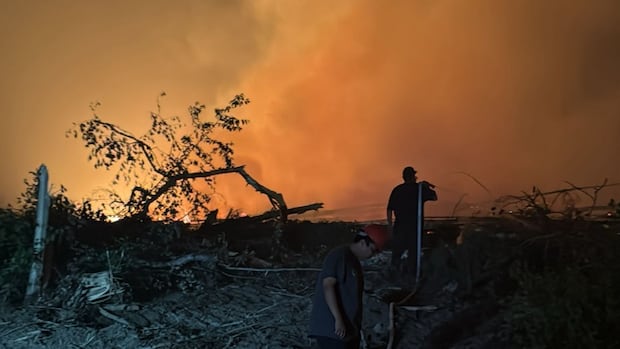Manitoba needs more fire rangers to keep communities safe from future risks, chief says
Recruitment is difficult due to risks of wildfire-fighting job, low pay relative to other provinces: union
The province is going to need to shore up its force of wildfire fighters in the future if it hopes to save more remote communities from having to endure the worsening cycle of forced evacuations, destroyed property and destruction of forests, says a northern Manitoba grand chief.
Grand Chief Alex McDougall of Anisininew Okimawin — a coalition of First Nations from northeastern Manitoba's Island Lake area, which has been largely evacuated due to wildfires — says more boots on the ground would've been a game-changer for his region.
"We wouldn't have that fire threatening our communities," said McDougall. "We wouldn't have these thousands of our people, of our communities, displaced from their homes into large urban areas, where sometimes they're not welcome."
Currently, nearly 13,000 evacuees, most from northern and remote First Nation communities, are displaced from their homes due to the worst wildfire season Manitoba has seen in three decades.
It's the second wildfire wave since the end of May, and Manitoba is under its second provincewide state of emergency. The provincial government plans to review the wildfire response going forward, as climate change could mean more active fire seasons in the future.
McDougall hopes those reviews lead to bigger firefighting teams so crews can attack wildfires more quickly.
"Where there is smoke there is fire, and we would deploy people to go and put it out right away," he said.
"Right now the policy is to just let it burn and watch it and see what happens. And this is the result of it — you see a lot of communities displaced."
A Manitoba government spokesperson told CBC News there are 58 full-time fire ranger staff, plus more than 300 more seasonal personnel.
A fire ranger, also known as a wildland firefighter or fire management officer, is a professional responsible for preventing and managing wildfires, ensuring public safety, and protecting natural resources in forested or wilderness areas, according to the Manitoba Government.
The union that represents wildfire fighters, the Manitoba Government and General Employees' Union, suggests this year's pool of workers amounts to 238 fire ranger members. That's about the same as it was in 2009, said MGEU.
Union president Kyle Ross suggested the dangerous nature of the work makes it challenging to recruit people.
"Not everybody is going to want to jump out of a helicopter and be dropped off in the bush for a day or two and fight a fire," Ross said. "Takes certain type of people to do that work."
Manitoba fire crews do get help from other jurisdictions, though Ross questions how the province is supposed to expand its own workforce if fire rangers can make more money doing the same work out-of-province.
Data from the federal government suggests Manitoba fire rangers make some of the lowest pay in Canada — $13/hour less than they would in British Columbia, where many more rangers are employed.
Ian Bushie, Manitoba's natural resources minister, says a review of seasonal operations could lead the province to add more firefighter positions going forward.
"That'll be part of the assessments as well, to be able to say where resources can be deployed in a strategic manner, but at the same time being able to address the needs across the province," Bushie said Thursday.
"This is now our new normal, potentially, so how do we address that in a meaningful way?"
Chief McDougall praised the provincial emergency management teams and fire crews for how efficient they were once his community evacuation got underway.
He also believes having more firefighters available in Manitoba's arsenal would've enabled a more aggressive, quicker fire suppression effort that could have avoided the evacuation entirely.
"It would've meant our community members staying at home," he said.

With files from Matt Humphrey


